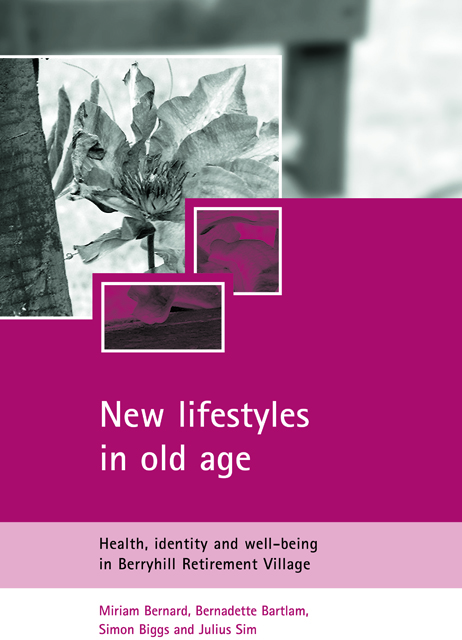Book contents
- Frontmatter
- Contents
- List of tables and figures
- Acknowledgements
- A day in the life of a retirement community resident
- 1 Retirement communities: the context
- 2 Developing a retirement community lifestyle: participation and involvement
- 3 Health and well-being
- 4 Growing older: age and identity
- 5 Conclusions
- References
- Appendix A Research questions
- Appendix B The study’s timeline
- Appendix C Questionnaires
- Appendix D Interviews
- Appendix E Participation groups and community conferencing
3 - Health and well-being
Published online by Cambridge University Press: 06 April 2023
- Frontmatter
- Contents
- List of tables and figures
- Acknowledgements
- A day in the life of a retirement community resident
- 1 Retirement communities: the context
- 2 Developing a retirement community lifestyle: participation and involvement
- 3 Health and well-being
- 4 Growing older: age and identity
- 5 Conclusions
- References
- Appendix A Research questions
- Appendix B The study’s timeline
- Appendix C Questionnaires
- Appendix D Interviews
- Appendix E Participation groups and community conferencing
Summary
Introduction
Health and well-being are fundamental to living a life of quality in old age. In this chapter we look at how living in Berryhill affects these key dimensions of growing older. We do this by drawing on both the qualitative and the quantitative data from the study in order to explore:
• understanding health and well-being;
• the health and well-being of residents;
• quality of life and life satisfaction;
• poor health but a better life?;
• maintaining health and well-being;
• meeting diverse health needs;
• health, support and well-being in the future.
We explore too changes over time across all three waves of the questionnaires to residents, as well as the views of the various stakeholder groups who took part in the study.
Understanding health and well-being
In this study, we have deliberately tried to move away from the traditional definition of health as simply an absence of disease or illness. Instead, we have been guided by the now more accepted and holistic definitions of health and, particularly by Antonovsky’s (1984, 1987, 1996) notion of a health continuum, along which people of any age can be placed. This way of looking at health moves us away from a focus on sickness and emphasises people’s own evaluations of their life circumstances and their sense of well-being (Bernard, 2000). Most importantly, this approach takes account of the ongoing relationship between individuals and their environment, including their personal relationships, and the social networks and structures within which they live. As such it offers insights into how people adapt to changes in the life course, and how they negotiate both the losses and the gains inherent in the ageing process (Baltes and Baltes, 1993; Westerhof et al, 2001).
Like health, well-being is a difficult concept to define but here, we relate it to quality of life. Traditionally, too, quality of life has been defined as the degree of absence of ill-health (Bowling et al, 1997). However, viewing well-being in this way takes no account of people’s coping strategies or ability to adapt to change in pursuit of their life goals.
- Type
- Chapter
- Information
- New Lifestyles in Old AgeHealth, Identity and Well-being in Berryhill Retirement Village, pp. 24 - 36Publisher: Bristol University PressPrint publication year: 2004



